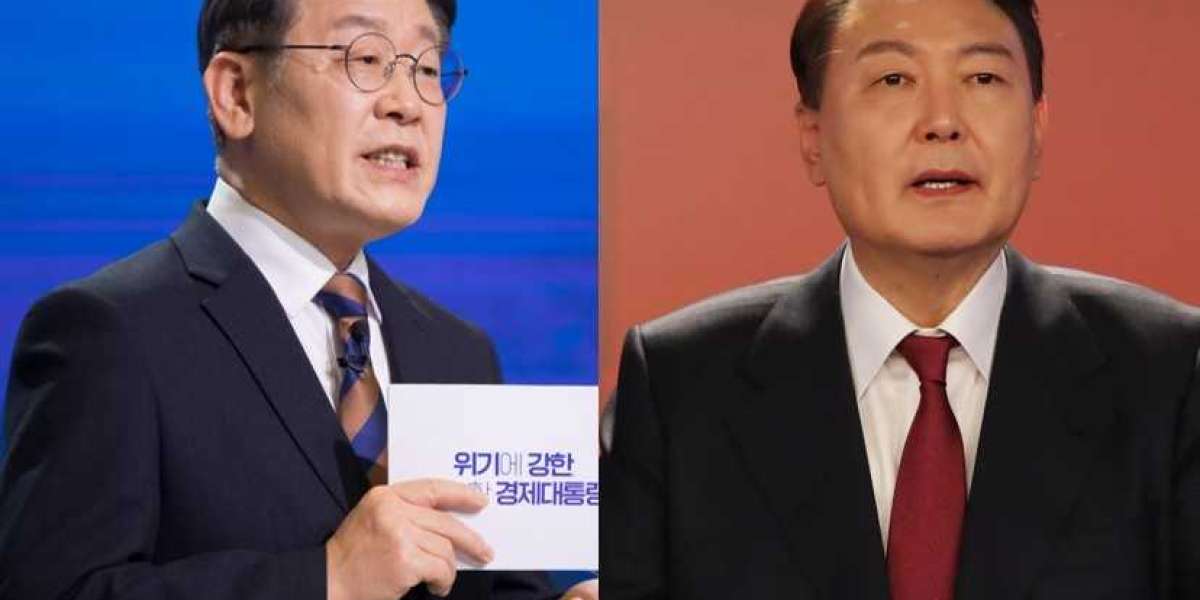Because of low voter interest and candidates' unwillingness to talk on difficult issues, Korea-Japan ties do not normally stand out as a key subject during the Korean presidential election, despite their importance.
Two leading presidential contenders, Lee Jae-Myung of the Democratic Party of Korea and Yoon Suk-yeol of the People's Power Party, have made no clear commitments to improve Korea's troubled relations with Japan. However, they did disclose their opinions on the neighboring countries on occasion. Both believe that ties between the two countries should be restored, but their approaches to resolving the thorny issues that remain are diametrically opposed to one another.
Japanese politics, according to Lee, and the Moon Jae-in government, according to Yoon, are to blame for the two nations' decision to turn their backs on one another. While Lee has stated that Japan "should confront the past," Yoon feels that ties between Korea and Japan were "at their worst" under the present administration because the Moon administration was "occupied with the past rather than the future."
As a result of a variety of issues, including forced labor, "comfort women" (military sex slaves), Japan's decision to release water from Fukushima, trade disputes in high-tech materials, and most recently, Japan's push to have the Sado mine designated as a UNESCO World Heritage Site, bilateral relations have suffered. The majority of the concerns are directly or indirectly connected to Japan's colonial control over Korea from 1910 to 1945.
In addressing the issues, Lee outlined the conditions that must be met by Japan. "Japan should publicly acknowledge (their atrocities) and express genuine regret to the victims."
Since his time as mayor of Seongnam, Lee's attitude toward Japan has been steady. On the International Memorial Day for Asian women who were forced into sexual slavery by the Japanese military during World War II, Lee openly attacked the two nations' agreement on Japanese military sexual slavery as "void" on the occasion of the 70th anniversary of the end of the war.
When Lee served as governor of Gyeonggi Province in 2019, he delivered a Liberation Day statement in which he sharply criticized the Japanese government, according to reports. He urged Japan to "wake up from a fruitless dream and face reality, as well as honestly accept the sins that it has perpetrated." He added that “a sincere apology and reasonable compensation should be made to the victims of forced labor and sexual slavery.”
Candidates Lee and Kim both stated that Japan has a "long history of inflicting significant harm" on Koreans during a recent conference conducted in November. After that, he went on to say that Japan should take a cue from Germany's stance toward European countries following World War II as an example.
On the possibility of military and security cooperation between Korea and Japan, he was not optimistic. As he put it, "there are instances when Japan's determination to extend onto the continent may be recognized." There is a history of exploitation in the organization, and it does not appear to be properly reflecting on that past."
Yoon Suk-yeol, on the other hand, makes just a passing reference to historical events that occurred prior to Korea's freedom from Japan.
Normalization of diplomatic ties between Korea and Japan, referred to as the 1965 system, was described by him as "a beginning point for a good neighbor relationship and co-prosperity" between the two countries. According to him, the two nations have a "shared liberal democracy and human rights" when it comes to their relationship.
Yoon does not impose any requirements on the resolution of previous difficulties. "We need to bring all of the concerns of forced labor, comfort women, security cooperation, and economic commerce together on a single table and approach it in a grand bargaining manner," he explained.
If elected, Yoon has stated that he will begin by engaging in discussion with Japan. "Even if it is a difficult topic, we can transcend the past if we can establish a point of contact and work together to implement it," he stated.
By far the most significant difference between the two presidential contenders is that Yoon is more receptive to the notion of a trilateral military alliance between South Korea, the United States, and Japan. He said, “It is still difficult to judge (the alliance issue), but it is clear that cooperative relations have no choice but to upgrade.”
The Justice Party's Lee and Sim Sang-Jung said Wednesday that the 2015 Japanese military sexual slavery agreement was an inappropriate agreement that violated the victim-centered principle. The Justice Party's Lee and Sim Sang-Jung were responding to policy inquiries from an advocacy organization for victims of Japanese military sexual slavery. Yoon and Ahn Cheol-soo of the People’s Party refused to answer.
Despite Lee's hard-line stance against Japan, many predict that relations with the country will improve regardless of who wins the presidential election in November. Both Lee and Yoon believe that the country's ties need to be repaired, and popular opinion is shifting as well.
"If Yoon is elected, he would work to improve relations with Japan in order to strengthen the Korea-US alliance, as has been projected." Even if Lee is elected, there is still opportunity for improvement in ties with Japan," said Hwang Jae-ho, a professor in the Division of International Studies at Hankuk University of Foreign Studies and a specialist in Japanese affairs.
The Moon government does not currently participate in any communication with Japan, but according to Hwang, Lee is expected to make judgments based on pragmatic diplomacy focusing on national interests in accordance with his pronouncements.
"Another thing to consider is that public opinion is shifting. (Koreans) today have a significant animosity for China, while they have a weaker hostility toward Japan. The public paid more attention to issues from the Beijing Olympics, but less on the Sado mine. "The policies (of whoever is elected) will reflect a great deal of public emotion," says the author.



